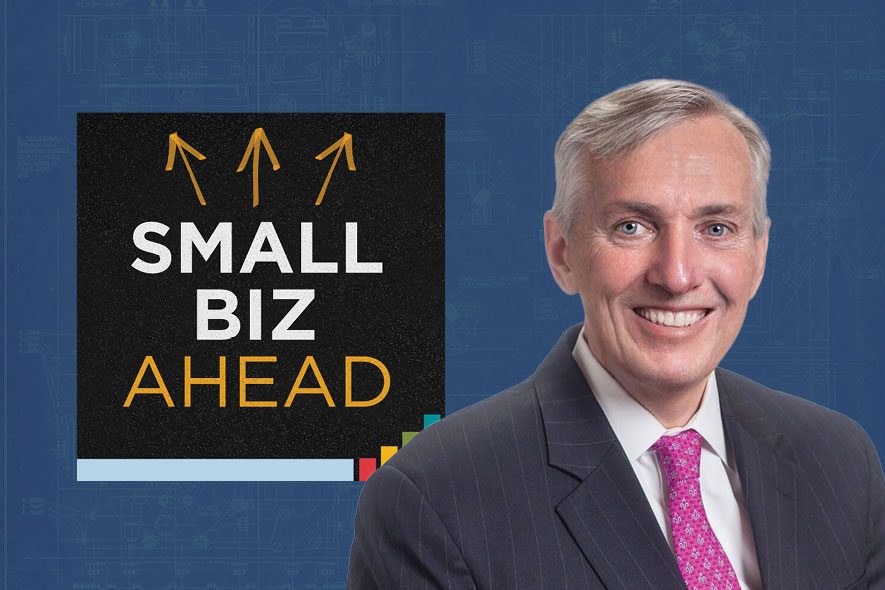Transcript
The views and opinions expressed on this podcast are for informational purposes only, and solely those of the podcast participants, contributors, and guests, and do not constitute an endorsement by or necessarily represent the views of The Hartford or its affiliates.
You’re listening to the Small Biz Ahead podcast, brought to you by The Hartford.
Our Sponsor
This podcast is brought to you by The Hartford. When the unexpected strikes, The Hartford strikes back for over 1 million small business customers with property, liability, and workers compensation insurance. Check out The Hartford’s small business insurance at TheHartford.com.
Gene (00:03):
Hey everybody, this is Gene Marks and welcome to another episode of the Hartford Small Biz Ahead podcast. Thanks so much for joining me. A couple of months ago, I talked a little bit about ChatGPT and I got an issue. I’m not gonna leave this topic. I’m gonna go come back and talk more about conversational AI, ChatGPT because it really, it’s just an enormous impact on, on your business and mine. But something else is even gonna have a bigger impact on your business and my business in the coming years. And it’s not ChatGPT, but it’s something called AutoGPT. So the question that I’m raising here in today’s segment is this, what exactly is AutoGPT? Well, let me explain what it is and why it is so important and why it’s taking the AI, the artificial intelligence in the technology community by storm. AutoGPT is like ChatGPT, except it does stuff on its own.
Gene (01:07):
In other words, it performs tasks automatically. So, for example, in ChatGPT and hopefully you’ve tried out ChatGPT, you can go to OpenAI.org and create an account for yourself and play around with it. It’s really awesome. But you’ll notice with ChatGPT, it’s a conversational chatbot. You ask it questions, it gives you answers, you then respond with something else. It comes back to you in responses to your response. You go back and forth, back and forth. It gives you suggestions, you quantify it. It’s a back and forth thing. It’s a conversational AI Chatbot. But that’s not the future of these AI bots. It is not the future of AI in general. What the future is automation, autonomous automation and that’s where AutoGPT comes in. It is a variation of ChatGPT, but it doesn’t use conversation.
Gene (02:04):
It makes assumptions and it does stuff on your own or on its own without any human involvement. So let me give you an example, okay? First of all, this doesn’t, this is still in its early stages, but when you say something in its early stages, there’s gonna be more development over the next few months. The next year or two, you’re gonna be seeing this as like mainstream stuff. So AutoGPT is something that you’re gonna have embedded in your applications and you’re gonna give it instructions and it’s gonna start doing stuff. And it’s not gonna come back to you with any more questions. It’s just gonna do it. So for example, if you have a CRM system, a customer relationship management system, like a Salesforce or a Zoho or a Dynamics or any one of those, okay?
Gene (02:54):
You could give, your CRM, the AutoGPT automation part of it that will be included in your CRM, some instructions, like I’d like you to send an email to everybody that’s a Philadelphia 76ers fan that bought this product and that lives in Pennsylvania and New Jersey. Compose an email about our new product offering. Here’s a link to it and send it to that group. And what AutoGPT will do, is it will compose the email. It will send out the email and then if you give a permission, it will handle responses. So it will learn, it’ll be trained on your past email campaigns. It will look at the response to your email campaign. And if somebody says, no thank you, I’m not interested, then AutoGPT will be trained to automatically maybe schedule a follow up six months later.
Gene (03:46):
Or if somebody does reply and says, yes, I am interested, AutoGPT will be trained to immediately respond with a certain type of an email saying, oh yeah, here’s more information about it and let me introduce you to Jane with a task scheduled or an appointment set up for Jane. Or if the response comes back asking for more information, AutoGPT will be trained to provide that information automatically and then alert other people. Does that make sense? It’s basically gonna be independent. It is a GPT, it’s automation, it’s AI, but it’s not gonna be much supervision. It’s not gonna need much supervision. Excuse me. So think about the impact that that has on your business. Think about all of this sort of routine or just a little bit outta the routine stuff that your people are doing.
Gene (04:38):
Like your order entry people, your customer service people, maybe people that are in customer support and answering questions, or you’re sales people. Think about the time that they are spending just responding to the same question over and over again. Or, doing tasks based on something else. Like if a quote gets sent out, scheduling a follow up and sending it to somebody else and alerting somebody else. All of these things that are being manually done. In the current version of ChatGPT, you can ask it for advice and it’ll come back to you with suggestions and thoughts and all of that, which is great. But when you have AutoGPT embedded in your systems, it will automatically create an order or send an invoice out the minute that it detects that something has been shipped.
Gene (05:26):
And that invoice, if it’s still outstanding over say 25 days, it will automatically send out a professional notice saying, just checking in on your payment and it will automatically be able to detect when payments are made and maybe send a thank you or it will automatically be able to detect when there is something wrong or a question raised or a problem so that it can alert people in your company. And then also send out emails to the people that need to know about it. All of this would be done…
Gene (05:56):
Automatically and it would change as your data is changed. So it’ll be constantly analyzing your emails, your correspondence, your quotes, your documents, your spreadsheets, your databases, both from accounting and customer order entry and inventory. And it’ll be trained to look for and handle certain events and do it automatically without a salesperson being involved or an order entry person being involved. Now obviously there, there are a lot of implications here. I mean, this is early technology, so it’s not necessarily the most accurate thing in the world. So I can imagine a lot of people will be a little bit hesitant to implement it because they don’t want emails going out to the wrong person or invoices being sent when invoices should not be sent. I get that. But let’s all agree that the accuracy of this stuff is gonna improve as this technology gets smarter and is trained a lot more. Other people are gonna have a concern that’s gonna eliminate jobs.
Gene (06:51):
And yes, this will definitely eliminate jobs because if you’ve got 10 people in your order entry department or your customer support department, it is quite likely that you will only need half as many or two-thirds as many to deal with higher level stuff or things that need more human involvement. Whereas the things that are routine and repetitive can be handled by AutoGPT. So yeah, it’s gonna replace people. There’s no doubt about it. By the way, whenever I hear about this technology replacing people, it doesn’t concern me about the future of human society because we’ve had technology since the beginning of time that have replaced people. How many blacksmiths do you see around nowadays? And yet people find other things to do to keep themselves, to keep themselves busy and to earn a livelihood. So that really doesn’t concern me as much.
Gene (07:39):
The bigger concern people have is whether or not AutoGPT can take over the world. And once it gets so smart does it even need humans, will it just be able to perform tasks and do things and maybe to the detriment of humans or to a business itself? And those are some big questions that need to be resolved, most likely through some type of government regulation and some type of partnership between the technology community and government regulators. I’m also confident there that all the mistakes will be made and some people are gonna get hurt. Ultimately there is gonna be some balance between that. But the bottom line is this, if you’re reading about ChatGPT… That is just the start. What you really want to be reading about is AutoGPT, it’s AutoGPT. AUTOGPT. That’s the technology that you’re gonna be using in your business to really provide automation and save you money and cut your overhead. Embrace it, learn about it, use it, develop it, research it. Why? Because I guarantee you some of your competitors are gonna be doing the same and if they implement it the right way, they’re gonna undercut you both on price and market, if you don’t keep up with the times. So AutoGPT is what you want to focus on, not necessarily…
Gene (08:54):
ChatGPT. Hope this information helps. You have been listening to the Hartford Small Biz Ahead podcast and my name is Gene Marks. If you need any advice or tips or help in running your business, please visit us SmallBizAhead.com or SBA.TheHartford.com. Thank you so much for listening. I’ll be back to you with some more thoughts and tips and advice to help you run your business next week. See you then.
Download Our Free eBooks
- Ultimate Guide to Business Credit Cards: The Small Business Owner’s Handbook
- How to Keep Customers Coming Back for More—Customer Retention Strategies
- How to Safeguard Your Small Business From Data Breaches
- 21 Days to Be a More Productive Small Business Owner
- Opportunity Knocks: How to Find—and Pursue—a Business Idea That’s Right for You
- 99 New Small Business Ideas





